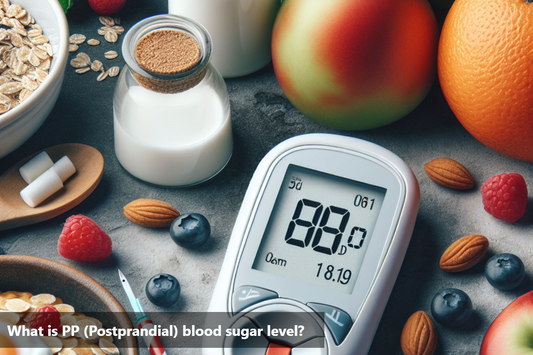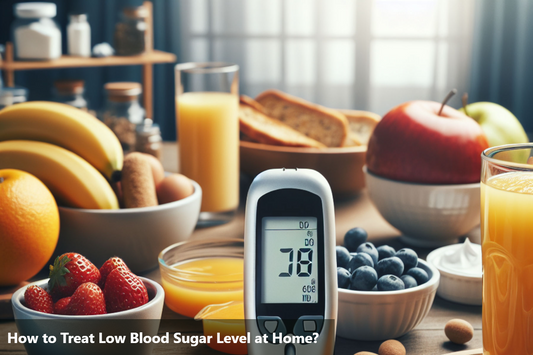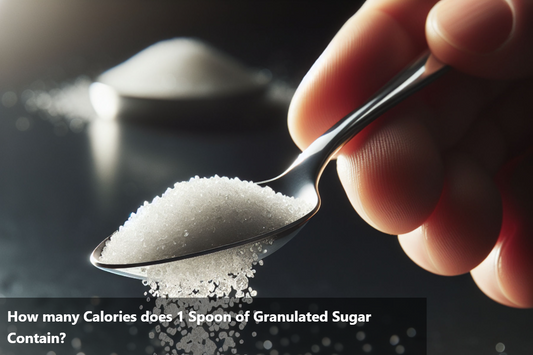High blood sugar levels, also known as hyperglycemia, occur when the body fails to regulate glucose properly. Factors such as poor diet, lack of exercise, stress, and certain medical conditions can contribute to elevated blood sugar levels. It is crucial to understand the causes behind high blood sugar and the significance of managing it effectively.
Increasing blood sugar levels can be detrimental to one's health, potentially leading to diabetic complications over time. Therefore, it is essential to adopt a proactive approach to managing blood sugar through proper diet, regular exercise, stress management, and medication as prescribed by healthcare providers. By taking control of blood sugar levels, individuals can significantly reduce their risk of complications and improve their overall quality of life.
Immediate actions for high blood sugar
Drinking water: When facing high blood sugar levels, one of the immediate actions to take is to drink plenty of water. Not only does this help in flushing out the excess sugar from the body through urine, but it also helps in staying hydrated, which is essential for overall well-being.
Exercising: Engaging in physical activity is another effective way to lower high blood sugar levels. Exercise helps the body to utilize glucose for energy, thus reducing the sugar present in the bloodstream. A combination of aerobic exercises like walking or cycling, along with strength training, can be beneficial.
Monitoring blood sugar levels: Regularly monitoring blood sugar levels is crucial in managing high blood sugar. Use a glucose meter to keep track of your levels. By doing so, you can observe trends, identify triggers that spike blood sugar, and make necessary adjustments to your diet or medication.
Seeking professional help: If high blood sugar levels persist despite these actions, it is important to seek medical advice promptly. A healthcare provider can offer personalized guidance and may suggest adjustments in medication or lifestyle modifications to better control blood sugar levels.
Stay informed: Education is key in managing high blood sugar levels effectively. Continuously educate yourself on the symptoms, causes, and treatment options for high blood sugar, empowering you to take control of your health proactively.
Adjusting diet and lifestyle
Choose Low-Glycemic Foods: Focus on consuming foods with a low glycemic index (GI), which are digested and absorbed more slowly, resulting in gradual increases in blood sugar levels. Examples include non-starchy vegetables, legumes, whole grains, nuts, and seeds.
Control Portion Sizes: Pay attention to portion sizes to avoid overeating, which can cause spikes in blood sugar levels. Use smaller plates, measure servings, and be mindful of calorie intake.
Eat Balanced Meals: Aim for balanced meals that include a combination of carbohydrates, protein, and healthy fats. This helps slow down the absorption of sugar into the bloodstream and promotes stable blood sugar levels.
Limit Sugary Foods and Beverages: Minimize your intake of sugary foods, desserts, sweetened beverages, and snacks high in added sugars. These can cause rapid spikes in blood sugar levels.
Increase Fiber Intake: Incorporate fiber-rich foods such as vegetables, fruits, whole grains, legumes, nuts, and seeds into your diet. Fiber helps regulate blood sugar levels by slowing down the absorption of sugar and improving insulin sensitivity.
Choose Healthy Fats: Include sources of healthy fats in your diet such as avocados, nuts, seeds, olive oil, and fatty fish like salmon. Healthy fats can help improve insulin sensitivity and reduce the risk of heart disease.
Seeking medical help
Contact Your Doctor: If you have signs of high blood sugar like feeling really thirsty, peeing a lot, being tired, having trouble seeing clearly, or finding it hard to focus, get in touch with your doctor. They can help you handle your blood sugar levels and might suggest changes to your treatment plan.
Book an Appointment: If you're struggling to keep your blood sugar levels in check by yourself or if you're worried about your health, make an appointment with your doctor. They can check how things are going, do any needed tests, and figure out why your blood sugar levels are high.
Talk About Treatment Choices: When you see your doctor, talk about different ways to treat your condition. This might mean adjusting your medicine, changing what you eat and how you live, or getting extra help to lower your blood sugar levels.
Follow Advice: Listen carefully to your doctor's advice, take your medications as they tell you, keep an eye on your blood sugar levels regularly, and make any diet or lifestyle changes they recommend. Keeping things consistent is important for handling high blood sugar levels and stopping issues.
Get Immediate Help if Needed: If you have severe signs of high blood sugar like feeling confused, super thirsty, urinating a lot, having trouble breathing, or passing out, call for emergency medical help right away. These signs could mean you have a serious problem like diabetic ketoacidosis (DKA) or hyperosmolar hyperglycemic state (HHS) that needs fast treatment in the hospital.
Stick to Follow-Ups: Go to your follow-up appointments with your doctor as advised to check how you're doing, make any necessary changes to your treatment plan, and talk about any worries or questions you have.
Get Involved in Diabetes Education and Support: Think about joining diabetes education classes or support groups to understand more about handling your condition, connect with others going through similar challenges, and get extra help and resources.
Bottom Line
To manage high blood sugar levels well, it's essential to act quickly when needed, adjust your diet and lifestyle, and get medical help promptly. By doing these things, you can better control your blood sugar levels and improve your health and well-being.
One important point in the blog is knowing what to do when your blood sugar levels are high. Drinking water, moving your body, and checking your blood sugar regularly are key steps in managing high blood sugar effectively. These actions can lower blood sugar levels and prevent problems.
Another important thing to consider is changing your diet and lifestyle. Eating a balanced diet, cutting down on sugar, and staying active can make a big difference in blood sugar levels. These changes are long-lasting ways to keep your blood sugar healthy.
Additionally, it's crucial to seek medical help if you have high blood sugar levels. Recognizing hyperglycemia symptoms and checking your blood sugar regularly can help catch issues early and manage them properly.
This Blog post is an initiative by DiabeSmart, to provide accurate and Nutritionist / Doctor approved information related to Diabetes. DiabeSmart is India's first Food brand designed specifically for Diabetics, that has been clinically tested on Diabetics and Pre-Diabetics to deliver 55% - 70% lower Sugar spikes. DiabeSmart is part of Lo! Foods - India's leading brand for Everyday Functional Health foods.







